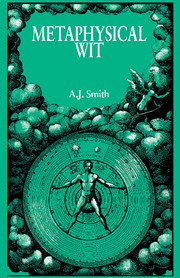2 - Mirror of creation
Published online by Cambridge University Press: 17 September 2009
Summary
The re-emergence of classical discussions of discourse loosed a flood of critical theory in the sixteenth-century, some of which directly fostered poetic wit. Two considerations dominate these sixteenthcentury exchanges and need to be put in focus at the start. One of them is the conception of perceived truth which shaped contemporary notions of metaphor. The other is the drive towards literary emulation which followed out the conceit of a rebirth of ancient wisdom. These concerns were formulated in cognate modes of imitation.
Imitation of nature curiously advanced the imitation of classic authors. The idea of imitating nature had metaphysical consequence when art was taken to mirror the order of the creation, or further our attempts to apprehend it. To imitate an ancient masterpiece might be to come nearer that ideal order when we seek to make the earlier writer's truth our own in some novel application, as it were revitalising the pristine vision. Both modes of imitation put in question our present capacity to comprehend the creation and our own nature. Both raise the issue of the relation of form to matter.
Renaissance thinking about discourse is ordered by Aristotle's schematic account in the Organon of the nature of the material universe. The sections of that work known as the Categories and Topica offer an analytic categorising of matter by qualities. This analysis is grounded in an absolute discrimination between essential qualities and accidental or contingent qualities.
- Type
- Chapter
- Information
- Metaphysical Wit , pp. 7 - 19Publisher: Cambridge University PressPrint publication year: 1992



